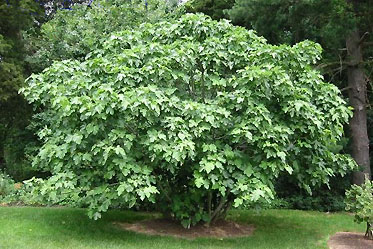
~ Reflection ~
by Deborah Beach Giordano
March 25, 2019
It Happens
This rather unsettling parable of the gardener and the unproductive fig tree will always hold a special place in my heart. Many years ago, after I admitted to struggling with its meaning, my good buddy Ed provided me with a delightfully succinct interpretation: “[Crap] happens — and it helps you to grow.”
 In polite company we might, instead, say: “All things work together for good for those who love the Lord.” But that’s not quite the same idea. Plain, earthy language gives a much more accurate description of the foul and fetid troubles that we occasionally face; those nasty experiences that seem to stick with us long after we think every trace has been wiped away.
In polite company we might, instead, say: “All things work together for good for those who love the Lord.” But that’s not quite the same idea. Plain, earthy language gives a much more accurate description of the foul and fetid troubles that we occasionally face; those nasty experiences that seem to stick with us long after we think every trace has been wiped away.
Crap happens. And — sometimes — it’s the best thing for us.
New Vision
Of course it doesn’t seem that way at the time. While they are happening, our troubles and tribulations seem (almost) beyond our ability to tolerate or endure. And yet, somehow, we do cope with the challenges, withstand the storms, and are not overwhelmed.
Afterwards, we are not as we were: like flood survivors, much of what we once “knew” has been swept away; the landscape is changed — although some familiar landmarks remain: we look around us, and it is as if we are seeing the place for the first time.
This new, changed life is different, and it is difficult, at least at first, but, as we continue, incorporating what we have experienced into our lives, we discover that we have changed along with it. Our outlook — our sense of self — has grown: we now know ourselves to be stronger than we imagined, more capable than we imagined; we see the world around us from a new, wider perspective. And, if we coped with the challenges in ways we now regret, or realize we might have done better, that knowledge itself is evidence of a new maturity.
Often, the “crap” we’ve endured causes us to blossom. Newly aware of our strengths, newly mindful of what truly matters, we do and dare — with more courage and more wisdom than before. Our hope and our faith grows stronger and, with humility born of experience, our hearts grow kinder, our compassion greater.
 Sometimes, of course, we fall back into the same old patterns, repeating the same mistakes, dealing with the same situation/s in the same, dysfunctional ways. This usually results in repeated applications of the same crap.
Sometimes, of course, we fall back into the same old patterns, repeating the same mistakes, dealing with the same situation/s in the same, dysfunctional ways. This usually results in repeated applications of the same crap.
Hmmm. There’s a thought: Crap as the “gift” that keeps on giving, until we deal with it rightly.
A Different Vision
To see our trials and troubles as fertilizer which will help us to grow, rather than effluvia to wade through, requires a good bit of faith and a lot of patience. It requires calm confidence when we feel pushed and rushed and frightened and cornered — not the easiest of times to “be still and know” the Beloved’s presence. It requires that we look beyond the immediate crisis or chaos; to behold ourselves with Christ’s eyes: as planted in God’s magnificent Garden, growing into the perfect fullness our Designer intended.

This sort of insight rarely occurs spontaneously — and even less often when the crap is running deep. We have to practice, so that it becomes a habit to stay rooted in the holy, the hopeful, and the good. The basic process is simple — but a successful outcome demands serious effort. Each evening, as we review our day in a relaxed and peaceful conversation with God, we consider:
How will this experience (this person, this event, this issue, this encounter, this day) help me to grow in grace and wisdom?
and we ask this about all that has transpired — not just the nasty, unpleasant things, but about all of our interactions.
Over time, this practice will become almost a reflex; we will consider it automatically, wisely and without delay. It will help to tamp down temptations to fear and anger, and increase our patience and our gratitude. And it will increase our humanity: our humility and our compassion for others who have stumbled and slipped up and knowingly sinned, for, if we are honest, we will see the times when what we have done (and left undone) was regrettable, wrong, and hurtful. We will recognize our responsibility to produce “good fruit” — to bless and heal as we have been called to do, admit the need to reform, and work to change our behavior — in other words: to repent, as Jesus teaches.
It’s important, too, to remember that it isn’t God/the vineyard owner who fertilizes the stagnant fig tree, but another, beneficial force: the gardener. This gardener is an advocate, intervening on the tree’s behalf, acting in its best interest; the fertilizer is not an evil, but a potential asset to help it grow and thrive. While this doesn’t directly address the issue of theodicy, to some degree it reframes the question of why bad things happen to good people: it isn’t punishment. Jesus makes this point earlier in the passage when he speaks of those who were murdered by Pilate and the others who were killed when the tower of Siloam collapsed.
In the Garden

If we get into the habit of looking at our lives as beautiful, growing things, we will become mindful of how we are being shaped — and by whom. When “crap” happens, we will not be afraid or outraged, but strong, courageous, and honest; we will seek the good, do our best, and leave the rest to God.
May Christ’s grace and healing love abound,
Deborah ✝
Suggested Spiritual Exercise
Each evening, in a relaxed and peaceful conversation with God, reflect on the day’s encounters and experiences and ask: How can these help me to grow in grace and wisdom?